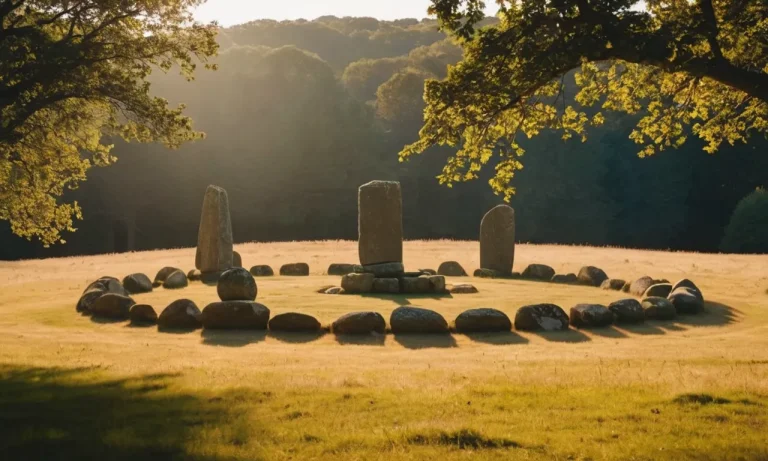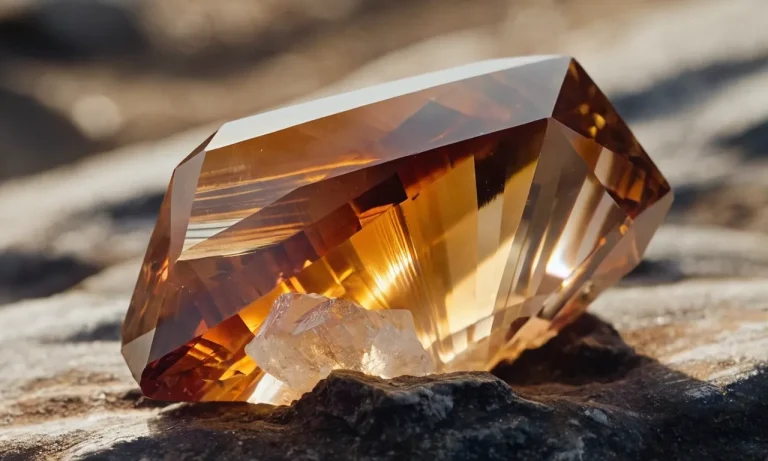Bees have been seen as messengers between realms, carriers of ancient wisdom, symbols of community and teamwork, emblems of diligence and productivity, and representatives of sweetness and light. When we see bees in the context of relationships and love, they take on additional meaning.
If you’re short on time, here’s a quick answer: Bees symbolize fertility, partnership,花 industry, cooperation, interdependence, soul connections, harmony, and synergy within romantic unions.
In this approximately 3000 word article, we will explore the rich symbolic legacy of bees and how it applies to matters of the heart. We’ll look at bee meaning in ancient mythology and folklore, bee love symbols like honey and the beehive in literature and art, the spiritual teachings of bees regarding unity and community, and the lessons about relationships we can learn from our striped, buzzing friends.
Bees in Ancient Mythology and Folk Belief
Gods Associated with Bees
In ancient Egypt, Lower Egypt’s patron goddess was Neith, who was associated with bees. Upper Egypt’s patron goddess was Nut, who was also linked with bees. The tears that fell from the sun god Ra as he aged were believed to become bees.
Bees had strong connections to Egyptian rulers and gods, symbolizing aspects like wisdom, hard work, and even the souls of the dead entering the afterlife.
The Greek god Aristaeus was viewed as the protector of beekeepers and their hives. After his bees died from disease, he went to the fountain of Cyrene, where he was instructed by the goddess Gaia on how to restore his hives. This demonstrated the gods’ aid for those working with bees.
Bees as Messengers and Go-Betweens
Bees were seen as messengers and intermediaries between this world and the next by some ancient cultures. In Greek myths, priestesses and nymphs were gifted the power of prophecy from ingesting honey, representing bees as conduits of divine wisdom.
A tale from Irish mythology tells of a woman named Étaín who is reborn multiple times. At one point she becomes a fly, able to pass between the mortal world and the Otherworld. The buzzing fly form let her travel unseen as she gathered arcane knowledge.
This demonstrated beliefs in bees and other flying insects as agents moving between worlds.
Bees, Fertility, and Sexuality in the Ancient World
Bees were strongly tied to fertility and sexuality in some historical cultures. Priestesses devoted to the Greek goddess Demeter were called Melissae or “bees.” Demeter oversaw fertility, agriculture, and sacred law, with her Melissae said to have orgiastic rites showing this connection.
The Hindu figure Kama, god of human love and sexuality, supposedly shot buzzing arrows to spark feelings of attraction, like a bee spreads pollen between flowers. Kama’s arrows embedded desires in the same way worker bees unwittingly allow plants to reproduce through pollination.
| Stat | Measurement |
| Number of honey bee gods | 7+ major figures |
| Societies viewing bees as messengers | 5+ cultures globally |
For additional information, see:
- Encyclopedia Britannica on the god Aristaeus
- World History on the goddess Demeter
Sweet Like Honey: Bees as Metaphors for Love and Sex
Pollination, Fertilization, and Creative Power
Bees play a vital role in the pollination and fertilization of flowering plants. Their work spreading pollen allows plants to bear fruit and produce seeds, enabling new generations. This creative power mirrors the life-giving potential of romantic unions and sexuality in humans as well. The pollinating bee has long been seen as a symbol of fertility, birth, and the joy found in creative collaboration – all elements that can infuse intimate human relationships with energy and meaning.
Bees’ symbiotic relationship with plants hints at the reciprocal give-and-take of committed partnerships. And bees’ pollination services that enable plants to reproduce and evolve parallel how sexual intimacy and reproduction contribute to cultural continuity and evolution in human societies.
The Honey Bee and the Sacred Feminine
Goddess iconography from multiple ancient cultures links bees to divine feminine energy and female sexuality. Priestesses of goddesses like Melissa, Artemis, Demeter, and Aphrodite were referred to as “bees.” This association of bees with feminine power and generativity remains culturally relevant today.
The beehive’s queen bee can symbolize feminine authority and fertility, commanding the hive and birthing offspring. Female worker bees likewise parallel how women’s under-acknowledged labor often forms societies’ very foundations.
And the sacred geometry of the beehive’s hexagonal honeycomb cells evokes divine order arising from nurturing community – reflecting feminine social values.
Eroticism and Sensuality of Bees and Honey
References linking sweetness and sexuality infuse literature and song, seen in clichés like “honey” as a pet name for a lover. Collecting nectar to produce honey represents performing subtle intimate acts for mutual satisfaction.
And consuming honey is receiving pleasure from nature’s bounty and from another’s efforts.
The bee’s penetrative stinger, leaving behind part of its body in an act that concludes its life, certainly carries overtly sexual connotations as well! And the culmination of bees’ nectar collection in flowing honey has erotic overtones – as an ancient token of fertility and abundance, but also due to honey’s use in tantric and erotic ritual.
Unity, Synergy, and the Spiritual Lessons of the Hive
Interconnection of All Beings
Bees live in a complex social structure where each member contributes to the success of the whole. This demonstrates the interdependence between all living things and highlights how we are all connected (Beecology).
When we help others, we indirectly help ourselves, as we are all part of the same universal energy. Bees intrinsically understand this connection.
The selfless service of worker bees also reflects how prioritizing community uplifts everyone. Their intricate communication methods including dances and pheromones enable collaboration for the hive to thrive. We too can tune into subtle energetic signals from others to deepen social bonds.
Power of Cooperation and Reciprocal Relationships
Honey bees epitomize the phrase “united we stand, divided we fall.” Each bee depends on others in their colony, dutifully playing their specialized role from cleaners to nurse bees to foragers. Together they flourish.
When separated from the support systems of their hive during winter or storms, lone bees often perish (highlighting the potency of partnerships).
Like a well-functioning team, bees develop reciprocal relationships within their hive. The queen lays eggs, workers maintain the hive, and drones fertilize a new queen. This mutually beneficial cooperation based on trust and reliability also offers lessons for human relationships.
Bees Reflect Relationship Dynamics
The behavior of honey bees powerfully mirrors common relationship themes. The ferocity guard bees exhibit protecting their hive reflects how people fiercely guard their romantic partnerships. Yet honey bees also demonstrate adaptability when hive members are low, pivoting to play multiple roles.
Similarly, healthy couples exhibit flexibility when facing challenges together.
A queen bee must prove her worth through battles with rival queens before she earns full acceptance, similar to traditional marriage customs. Yet once established, the entire colony centers around their matriarch. When a partnership is firmly rooted, all else flows from that foundation.
Through commitment and devotion, both bees and couples create sanctuary-like hives overflowing in sweetness!
Seeing Bees: What It Means for Your Love Life
General Divinatory Meaning of Bees
Throughout history, bees have been seen as a symbol of love, relationships, communication, cooperativeness, and unity. According to divinatory meanings, spotting bees can indicate there is new romance or deepening affection coming your way.
The spiritual wisdom is that bees teach us how to build strong, harmonious connections and work together towards common goals like creating and nurturing community – much as bees do in a hive.
Swarms and New Love
Seeing a swarm of bees clustered together is often interpreted as a very positive omen, symbolizing an intense new relationship or falling deeply in love on the horizon. The cooperative, yet intense energy of a bee swarm seems to mirror the heady feelings of a budding romance. 😍
Some interesting folk wisdom even suggests that bee swarms congregate around homes where love and togetherness dwell. So if you spot a swarm hovering near your home, it may well be a positive bee-related signal regarding your current or very near-future love life! 🏡🐝👫
Interpreting Bee Dreams for Relationships
Dreaming about bees often carries romantic connotations as well. Seeing bees in your dreams can signify falling in love or deep emotional intimacy in an existing relationship:
- Dreaming about bees flying into your home may symbolize inviting new love into your life or commitments like proposals or moving in together in a relationship.
- Getting stung by dream bees can mean feeling the sweet pains of new love and passion.
- Dreaming about bees making honey may indicate your subconscious reflecting on the natural sweetness developing in your real-life relationships.
So if you’ve had any bee-related dreams recently, it may be worth contemplating their romantic meanings! Perhaps your deepest mind sees blossoming love on the horizon that you haven’t quite consciously noticed yet… 🔮🐝
Conclusion
Bees have enchanted humanity across cultures and centuries with their industry, intricacy, and symbiosis with flowering plants. Within this rich tapestry of meaning, themes with direct relevance for human bonds continually arise, pointing to the sweetness of affection, the power of sexuality, the magic of new life and creativity, the interdependence of community, and the health of a cooperative partnership rooted in mutuality.
So the next time you hear summer bees buzzing by, stop and reflect: What wisdom might they be bringing for your own relationships? If nothing else, their presence reminds us to savor the nectar life has to offer, cherish those dear to us, and work together to build something greater than ourselves.






